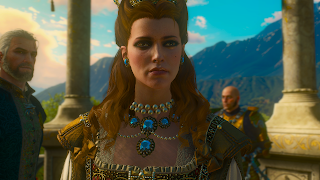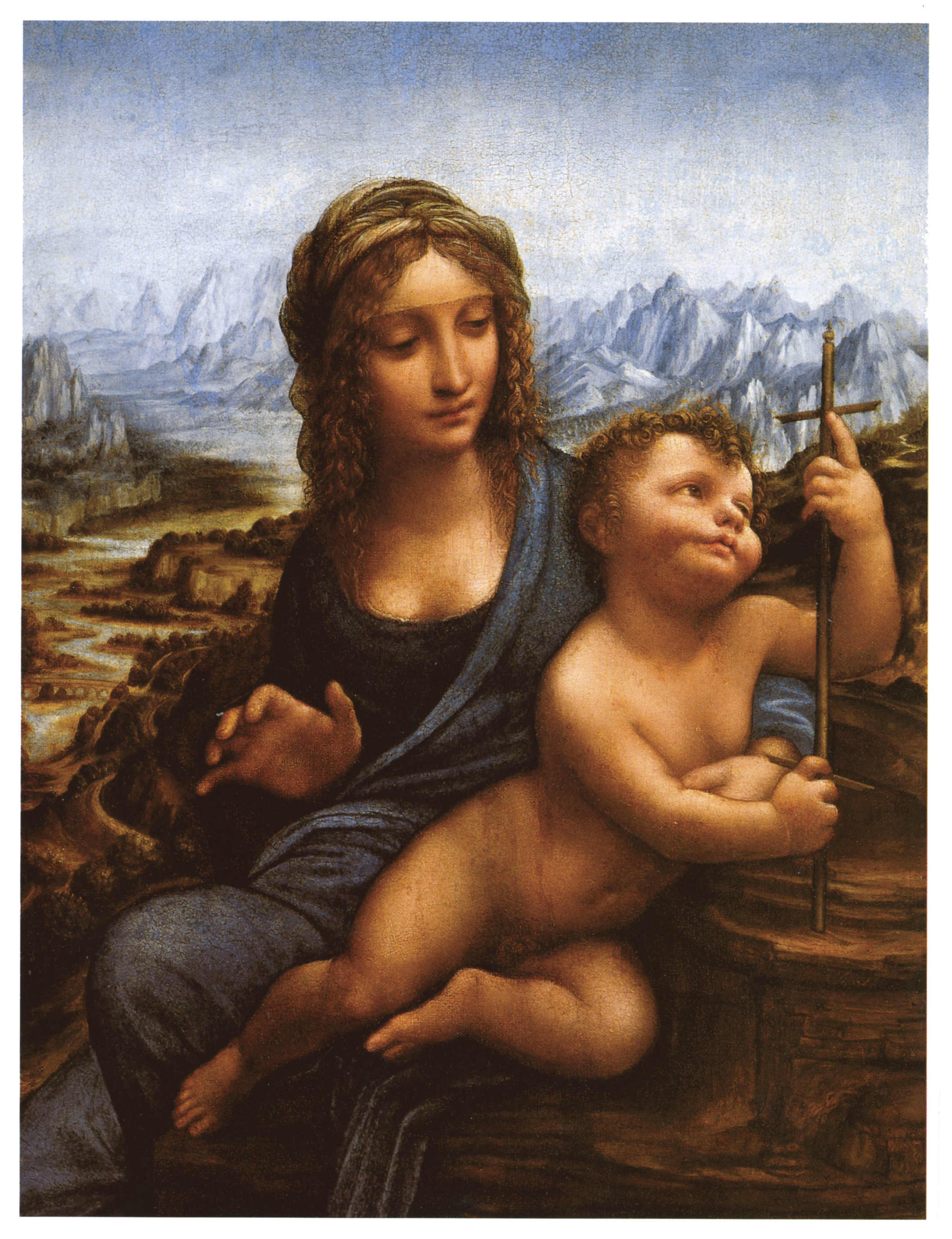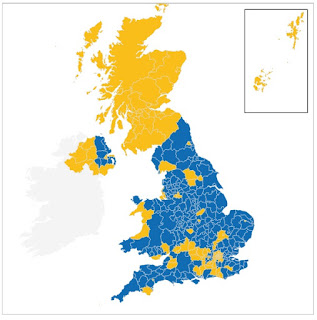 |
| Anna Henrietta |
Last night I managed to get
Anna Henrietta, Duquessa de Toussaint, killed.
I didn't mean to. I intended exactly the opposite. And in the moments after she was assassinated I rocked back quite literally, thinking 'my God, what have I done?'
I could have prevented her death. I did - clearly - know the risk. I had even alerted the captain of her personal bodyguard to it. But I did not tell the Duquessa herself, and I could have done so. I did have the opportunity.
Today, I have been thinking through the scene again, and come to the conclusion that, despite the dreadful consequence, I had made the right decisions. Geralt must believe in the possibility of redemption; otherwise he is not a monster slayer, he is just a monster.
Geralt?
When you play computer role playing games, you very often have great latitude to choose the character you play as. As such games have become increasingly voice-acted, it's no longer possible in many to choose the name of the character you play as; in the Mass Effect series, for example, you play as '
Shepard', but you may play as male or female, and have a wide choice of character traits.
But in The Witcher series of games, you play as Geralt, and Geralt is not malleable. He has an established character, created over a series of post-modern fantasy novels set in a dystopian eastern European by a highly regarded Polish writer,
Andrzej Sapkowski. If you're not familiar with his work, the nearest thing in English literature would be
Angela Carter.
Sapkowski uses his fairy tale world to talk about dark themes: ethnic and religious war, pogroms, genocide, ethnic cleansing, evil and redemption, the conflict between free will and destiny or fate. He does this centrally through the adventures of Geralt, a 'Witcher', or itinerant pest control operative.
Witchers, in his world, are a guild of specialist hunters, hunting and killing such magical pests as ghouls, draconids, vampires and so on. They do this largely for hire. Witchers are uncommon partly because the training is extremely arduous and involves the use of performance enhancing drugs which are toxic and cause the deaths of many trainees, and partly because religious cults view them as abominations.
Within this framework, Geralt, as he emerges from the novels, is a terse, hard-bitten man who affects cynicism but is deeply concerned with the morality of his actions; who is at once serially promiscuous and at the same time has strong loyalties to several lovers and a magical quasi-monogamous bond to one in particular, a sorceress,
Yennefer of Vengerberg.
In playing The Witcher games, you play as this character, and it's my experience that whether you intend to or not you will gradually inhabit this character, thinking hard about making the decisions that Geralt would make. Because the greatest strength of the series - and they have a galaxy of strengths - is the moral ambiguity of the world. Decisions are hard. There are no clear blacks and whites. There are uncertainties. It is a world in which you - you playing as Geralt - must do the very best you can, knowing that whatever you do you may not be able to prevent bad outcomes.
The death of Anna Henrietta is a case in point. As a child, her sister, Silvia Anna, was believed to be cursed, having been born during a solar eclipse. As such she was considered to be evil, and blamed for everything that went wrong. Sometime in her late childhood or very early adolescence, her parents had ordered a group of knights to take her deep into the wilderness in winter, and abandon her there. There is an implication that the knights raped Sylvia Anna before they abandoned her.
Many years later, Sylvia Anna has returned. She has, by a process of blackmail and deception, had the knights who took her out to be abandoned hideously murdered. If you follow the path through the plot that I followed, you have foiled her further plot and have captured her; you know for certain that she's manipulative and cunning, and, crucially, you know that she had intended to kill her sister.
Is Sylvia Anna evil because she was born during a solar eclipse? Or is she angry and vindictive because of how she was treated as a child?
On the other side, Anna Henrietta is an absolute ruler, spoiled, arbitrary, passionate, given to management by tantrum; when her sister accuses her of a lack of compassion it's hard to disagree with that charge. Anna Henrietta, as the younger sister, was a child when Sylvia Anna was abandoned, and didn't become ruler until some twenty five years later. Nevertheless, it's true that since she became ruler she hasn't done anything to find out whether her sister really did die, certainly hasn't sought her out.
However, in a world where war, genocide and pogroms are widespread, Anna Henrietta's quasi-independent duchy is relatively speaking extremely well ruled. There is no war. There is no starvation, although there are a few beggars. There is order and a certain degree of justice. Anna Henrietta is, then, no paragon; but, within the context of her world, she's a better ruler than most. There is also no obvious succession, so the potential consequences of Anna Henrietta's assassination are all the more dire.
In this situation, should I let an attempted reconciliation between the sisters go ahead?
I did. I encouraged it.
I believe that is what Geralt would do. More, I believe it is what Geralt should do. More yet, it is what I, playing as Geralt, would do again.
Because it is right that the spoiled, fortunate, successful sister, having chosen against character to show love and compassion, should have an opportunity to do so. And it is right that the despised, outcast, sinned-against sister should have the chance to repent her own sins and find redemption.
It was, I say again, the right decision for Geralt to make, and I, playing as him, made it. And he, and me playing as him, are responsible for the consequences.
So, one decision. One hard decision, on the outcome of which two women die who did not need to die, and a peaceful duchy is brought to the brink of civil war. A hard decision which you take with careful seriousness, and which afterwards you rethink and rethink and rethink - how could I have played this differently? A real moral dilemma, a genuinely engaging piece of action. Is this what makes The Witcher as a game?
Yes, a thousand times. Because over the course of the series there are certainly hundreds, probably thousands of decisions of equal weight. Story telling, character, and the agency of the player to act within the story and by so doing change its outcome of the story. Moral ambiguity, hard decisions, are, as I said, the greatest of the many great strengths of this series of games.
What are the others?
Toussaint, the duchy over which Henrietta Anna rules and in which the tragedy of the two sisters plays out, forms an epilogue to the plot of of
The Witcher III: The Wild Hunt. It is a sort of idealised
Languedoc, strikingly reminiscent of Guy Gavriel Kay's
Arbonne; it's stunningly beautiful, a limestone landscape of bright sunlit days and lambent nights, among vineyards, olive groves, sunflower fields, forests and open
maquis, full of castles, comfortable homes and ancient ruins, and centred round the beautiful - and beautifully realised - city of Beauclair. Simply riding through the land of Toussaint is sometimes startlingly reminiscent of watching the Tour de France - the landscape is that well realised.
And it's peopled with wonderfully rich characters. Foppish knights, philosophical vampires, a most engaging boot-black.
 |
| Beauclair |
But this richly beautiful environment isn't the world of The Witcher 3; it's an afterthought, an indulgent bit tacked on at the end. The majority of the action of the story ranges across the war-ravaged landscape of the northern realms, as competing minor kingdoms, faced with determined invasion by a much more powerful southern empire, instead of uniting fall into internecine chaos.
Across this scarred and blighted landscape Geralt's adoptive daughter is hunted by powerful magical enemies. The action of the main plot is to track her down, to gather allies who can together overcome these enemies, and finally to confront and defeat them. Not then, in itself a hugely compelling plot; but as this main plot drags you across the world it throws you into a series of other plots, stories and dilemmas.
What hits you about any of The Witcher games is the extraordinary beauty and conviction of the game world. Everything is believable; the world has very few artefacts which break the willing suspension of disbelief. For example, signposts are used in this third game as fast-travel points, which is convenient but unnatural, but they look just like one would expect medieval signposts to look. In fact, I very quickly stopped using fast travel; the world is so beautifully realised that it was an actual pleasure to ride across it, enjoying the scenery and happening upon new adventures organically.
The world is a reimagining of thirteenth century Europe in exactly the same way that Arbonne, or Lois McMaster Bujold's
Chalion are. But it is very specifically a Polish reimagining, and in that reimagining are remembered the brutal crusades of the Teutonic Knights, the history of pogroms, the savageries of the thirty years war and of the Nazi holocaust. All these and more are distilled with the grimmest of fairy tales into this landscape - a landscape of abandoned battlefields, of heaps of corpses, of roving bands of deserters and bandits, of terrified refugees, of feral orphaned children, of carrion-eaters, smugglers, spies, guerrillas, warlords. But it's also a landscape of orchards, forests, swamps, rivers, farmlands, villages and cities.
To say this world is of extraordinary beauty is not to say it's a world of sweetness and light; on the contrary it's a world of war, massacre, genocide, terrorism, despotism, fundamentalism - and a world filled with every monster and supernatural being from a broad sweep of European folklore. This is strictly adult art, and not because it includes sex scenes (although, yes, it does). It's adult because it includes scenes of extraordinary and visceral brutality. For example, the scene which plays when the player first enters the main square in the free city of Novigrad is a real, bloody horror.
Amidst all this is a great deal of satire and wit. I greatly enjoyed my visits to the university town of Oxenfurt, although even there the academy is closed because the local ruler wanted the young men for his war effort, and because the fundamentalist sect he encouraged wanted the books burned.
There are few bugs. Your horse, Roach, will very occasionally get stuck somewhere improbable, or will put his head through an apparently solid wall. I once saw a monster - a harpy - stuck in a wall. In over one hundred hours of playing the game has crashed only once.
Sailing boats always seem to have the wind behind them, even if you sail in circles.
There are also usual issues I complain about in all games of this genre. As characters have become increasingly voice acted - in common with many modern games, this one is entirely voice acted - so the richness of interaction has declined, because it is much more complex and time consuming to voice-act deep dialogue trees than simply to script them. So the vast majority of non-player characters you encounter have no conversation at all.
Partly in consequence of this, there are too many situations where the only way to deal with an opposing character is to kill them - and it would be very difficult to get through the game without killing many people, who are often little more than petty criminals or soldiers of a tyrannical king. It would, for me, have been improved either by having better ways of negotiating a way through potential conflict situations, or of using stealth to work round them.
There's another downside to voice acting. It seemed to me - and I may be wrong - that Shani, a character I'll come back to later, was voiced by a different voice actor in the third game. This obviously is a minor point; but together with a subtly updated character model (which actually isn't unreasonable - Shani would be ten years older, although she still seems very young) it made a character whom I felt I knew well and very much liked suddenly unfamiliar, and, as such was jarring.
A final issue before I stop carping on about voice acting. It's clear that lip-synch for the game is not to the English text (I imagine it's to the Polish text, and it's quite reasonable that it should be). In many conversations, characters go on apparently speaking silently for significant periods after the English language speech has come to an end. So I had an uncomfortable feeling that there were probably subtleties and nuances in the original Polish script that were quite literally lost in translation.
There's a more serious issue, for me, with the characterisation of Geralt's potential love interests. Partly this goes back to Sapkowski's books. Geralt's primary lover, and most of his incidental lovers, are sorceresses; this is taken from the books. Also taken from the books is the fact that the sorceresses, as a class, are manipulative, devious, ambitious, vengeful and deeply engaged in the internecine politics of the northern kingdoms.
Again, from canon, Geralt is bonded to Yennefer by a magic bond which he himself chose to make. He cannot help but love her (and she him), but this is because of a wish which Geralt himself made to resolve a serious problem with a djinn. He had to make a wish, but he did not have to make that specific wish. So Geralt is bonded to Yennefer, but because he has chosen to be.
The problem for me is that Yennefer as realised in the game is not a particularly likeable person. She's certainly very beautiful, but she's also certainly manipulative. She's on balance good, and she does help out when the going gets tough, but she also certainly uses Geralt. In the course of the game, Yennefer undoes the magic bond, so that she and Geralt are no longer magically constrained to love one another. And really, when you don't have to, I don't see why you would.
This is, as I've said before, not really a problem with the game. The game does realise the character of Yennefer very much as she is drawn in the novels. It's just that the game doesn't show you - or at least, didn't show me - why Geralt would choose her.
This issue is for me conflated because the alternative love interest in the main plot is Triss Merigold. Again, she's a sorceress. Again, she's a character taken from the novels, with her own canonical past. From the novels we already know that she and Yennefer are friends. But, in the sequence of games (which if you're playing this third game, are also sort-of canon), in the first game, in which Geralt was suffering from amnesia, she was also a main plot love interest. In character she's remarkably similar to Yennefer - she's arrogant, manipulative, and (in both the first and third games) uses sex with Geralt essentially transactionally to get him to do things that she wants done.
In this third game - at least, following the path I followed - Triss seemed to be drawn as a slightly warmer, slightly more sympathetic character than Yennefer. It has to be said that in my game I chose Yennefer, not Triss; if I'd made the other choice perhaps I'd have a slightly different view (and I do intend to play through again in order to find out).
But the fact is, for me, these characters are very similar. If you wouldn't choose one, why choose the other? There are many female characters in the plot who are at least equally attractive and who seem just much better people. I'd mention two in particular: Cerys an Craite, one of the candidates for the vacant kingship of the isles of Skellige, who I thought a genuinely serious, thoughtful, thoroughly likeable person (I supported her candidacy, and saw her elected); and Shani, the other main-quest love interest from the first game (in the books, Shani is never a lover of Geralt's, but does have an affair with his even more promiscuous friend and amanuensis Dandelion).
Shani is a sort of thirteenth century Medecins sans Frontiers; she's a dedicated doctor who practices her trade in plague hospitals and on battlefields. She is again presented as a serious, thoughtful, warm, generous person, and is in my opinion definitely the better of the two choices of love interest in the first game. In the third game, however, she appears only in an epilogue, and, in that epilogue, although there is a path for Geralt to have a casual liaison with her, there does not seem to be (or I did not find) a way to build that into a more settled relationship.
My 'big' computer is, even by today's standards, quite powerful (i7, eight core, 3.2 GHz, 16Gb RAM), and has a fairly good graphics card. I was able to play through the early part of the plot on very high graphics settings, and, on those very high settings, the visual beauty is remarkable. However in the crowded, incident filled streets of Novigrad the graphics performance started to struggle, and I had to turn the settings down a bit. I never turned them up again, because actually on medium settings it's still extraordinarily beautiful and runs without stuttering. Nevertheless it would be interesting to play it with a really top-end modern graphics card to see how much difference it made!
So, minor flaws. Very minor.
But how does one sum this up?
It's an astonishing achievement. A work of art bigger in scope than a dozen feature films, than a handful of novels; as big in scope as one of the modern blockbuster TV series such as Game of Thrones. But, in contrast to any of those things, this is not a linear narrative. Instead, the consumer - the player - is deeply, personally involved in the plot, making thousands of decisions which will affect the fates of characters and of nations. And amidst all that complexity and variability, the story not only must play out to a satisfactory conclusion: it does do so.
I never noticed a building model which had been reused (although the world contains, certainly, tens of thousands of buildings); if plant models were reused (and I'd assume they were) again, I didn't notice it. A few character models are reused, but mostly these are uniformed guardsmen (for example) who would look alike. The only voice character model I noticed being reused was one merchant. The depth and richness of the art needs to be experienced to be believed.
I've described the very broad outline of the plot, and story-telling. I've described a few of the hundreds of characters. I've sketched a few elements of the scenery. I haven't begun to describe the wonderfully realised and varied architecture, the glorious sound track, the superb animation.
I took a fairly direct route through the main plot, and then played both the Heart of Stone and Blood and Wine extensions. There are many subplots and sidequests I haven't yet explored, and, of course, there are combinatorially many hundreds of thousands of alternative paths I could have taken through the main plot (although there will be at most only a few tens of these which are very substantially different).
The score system says that, in over 100 hours of playing, I've explored only 36% of the world, and I'll believe that. Thus, compared to something like, for example, all the box sets of the Game of Thrones television series watched end to end, this is substantially bigger. Size, of course, is not quality; but the combination of the quality - which I hope I've conveyed - and the scope make this an epic, a monumental, cultural achievement.
If you're at all interested in story telling, in fairy tales, in European history, in modern literature, I urge you very strongly to experience this game.


























